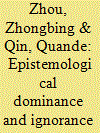|
|
|
Sort Order |
|
|
|
Items / Page
|
|
|
|
|
|
|
| Srl | Item |
| 1 |
ID:
092642


|
|
|
|
|
| Publication |
2009.
|
| Summary/Abstract |
As part of a strategy to remove perceived biases operating against it in the system used for elections to the House of Commons, the British Conservative party is promoting a revision of the rules used by the Boundary Commissions to ensure greater equality in constituency electorates. A Bill designed to achieve this-and also to reduce the size of the House-was introduced to the House of Lords in 2007. This paper critiques that Bill and suggests an alternative formulation that would better achieve the goal, whilst identifying a number of operational difficulties that its implementation would involve.
|
|
|
|
|
|
|
|
|
|
|
|
|
|
|
|
| 2 |
ID:
171495


|
|
|
|
|
| Summary/Abstract |
This paper reports on a critical discourse analysis on a collection of international scientific journal articles, which are a critical edge of social epistemology. At the textual surface, the analysis finds that China's shale gas (SG) is compared most frequently with coal and energy imports but rarely with conventional natural gas (CNG) and coalbed methane (CBM), representing a prominent structure of epistemological dominance and ignorance. Situated in this structure there are four prevailing, albeit defective, reasoning forms. The prevalence of those forms suggests that there is a “knowledge deficit” on the comparative advantage of China's SG. This deficit concretely refers to that, the attention paid to the comparative advantage of China's SG toward CNG and CBM, the number of lifecycle-comparisons between energies, and the knowledge about the US shale gas boom, are significantly insufficient. China's energy mix, air quality and energy dependence, the conspicuousness of energy burning, and the nature of human thinking are interwoven factors of this deficit. The epistemological structure and thus the “knowledge deficit” are unfavorable for optimizing China's SG strategy and may delay natural gas' penetration into China's energy mix. This paper, especially its mental model representation, is awareness/introspection provoking to researchers and policy makers.
|
|
|
|
|
|
|
|
|
|
|
|
|
|
|
|
| 3 |
ID:
130439


|
|
|
|
|
| Publication |
2014.
|
| Summary/Abstract |
In the past two decades, the number of grass-roots NGOs in China has grown dramatically, yet most scholarship on Chinese civil society has had little to say about the resources on which they rely for survival. This article presents the first large-scale study of these groups and their resources. We compare 263 NGOs across issue areas (including HIV, education, the environment and labor rights) and regions (Beijing, Guangdong and Yunnan). We find that these groups are tapping into high levels of human resources-volunteers, boards of directors and informal government ties-even without official government approval for their activities. We also detail their sources of funding, revealing a diverse support system with clear regional and issue-based biases. Taken together, our findings form a baseline for understanding China's grass-roots NGOs and point out new research questions that have yet to be addressed in the civil society literature.
|
|
|
|
|
|
|
|
|
|
|
|
|
|
|
|
|
|
|
|
|